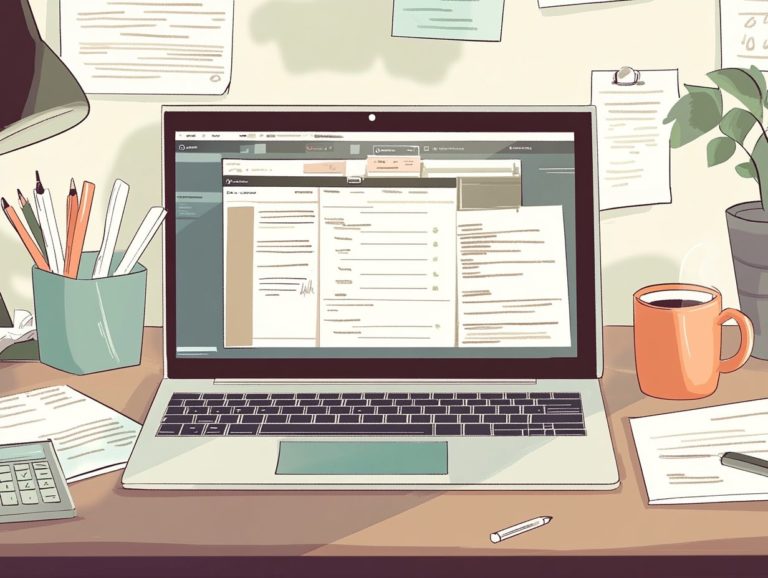What to Do If You Owe Back Taxes as a Freelancer
Freelancing provides you with the freedom and independence to chart your own course. However, it can also bring along a tangled web of tax complexities, particularly when it comes to back taxes.
Grasping the concept of back taxes why they accumulate and how to resolve them is essential for every freelancer. This article will walk you through the common reasons that may lead to owing back taxes, delve into various repayment options, and offer actionable steps to help you address the situation effectively, including options like payment plans (arrangements to pay your back taxes in installments) and other financial services.
You will also discover strategies to prevent future tax complications, empowering you to maintain your financial savvy as you navigate your freelance journey.
Contents
- Key Takeaways:
- Understanding Back Taxes for Freelancers
- Common Reasons for Owing Back Taxes
- Options for Paying Back Taxes
- Steps to Take to Resolve Back Taxes
- Preventing Future Back Taxes
- Frequently Asked Questions
- What to Do If You Owe Back Taxes as a Freelancer?
- How do I know if I owe back taxes as a freelancer?
- What if I can’t afford to pay my back taxes?
- Will I face penalties for owing back taxes as a freelancer?
- Can I still file my taxes if I owe back taxes as a freelancer?
- What happens if I ignore my back taxes as a freelancer?
Key Takeaways:

- Know what back taxes are and how they can affect you as a freelancer or small business owner.
- Avoid owing back taxes by accurately reporting your income and making estimated tax payments. Act now to avoid penalties!
- Resolve back taxes by exploring options like payment plans, offers in compromise, and installment agreements.
- Gather all necessary information and communicate with the IRS to effectively resolve your back taxes, including important forms and documentation.
- Prevent future back taxes by maintaining proper records and implementing tax planning strategies.
Understanding Back Taxes for Freelancers
Understanding back taxes is essential for freelancers navigating their tax obligations. Back taxes refer to unpaid taxes from previous years, which can accumulate interest and penalties over time.
As a freelancer, just like any self-employed individual, you need to keep meticulous records of your freelance income and expenses to stay in compliance with IRS regulations and optimize your tax return. Failing to report accurately can lead to significant complications during tax season. Understanding the implications of back taxes and how they can impact your financial health and accounting practices is vital. Additionally, navigating quarterly taxes as a freelancer can help you manage your obligations effectively.
What are Back Taxes?
Back taxes refer to the amount you owe to the IRS for unpaid taxes from previous years, often stemming from inaccuracies on your tax returns. These obligations can emerge from various scenarios, such as underreporting your income, claiming deductions that aren t authorized, or simply neglecting to file a return altogether.
To calculate your back taxes, it’s essential to meticulously review your past income, understand the applicable tax rates for those years, and consider any credits or exemptions you may have overlooked. The IRS has stringent regulations regarding late payments, which can result in escalating consequences. For creative freelancers, knowing 5 essential tax tips can be particularly beneficial. If you find yourself not following the rules, you might face penalties, accruing interest, or even potential legal action. This underscores the critical importance of addressing back taxes promptly to sidestep greater financial strain.
Common Reasons for Owing Back Taxes
As a freelancer, you might find yourself facing back taxes for several common reasons, such as underreporting your income or neglecting to pay estimated taxes throughout the year. Grasping these pitfalls is crucial for maintaining a solid relationship with the IRS and fulfilling your tax obligations.
Many professionals tend to overlook the significance of precise reporting or underestimate their freelance earnings. This oversight can lead to unexpected back taxes and complicated financial situations. By staying informed about these issues, you can navigate your accounting more effectively and steer clear of potential future problems.
Underreporting Income
Underreporting income happens when freelancers’ don t declare all their earnings on their tax returns. This can lead to back taxes and potential audits by the IRS.
You might not even realize you re underreporting, often due to overlooked income sources such as 1099 forms or unexpected errors. For example, missing out on 1099 forms from clients can easily result in unaccounted earnings, significantly affecting your financial picture.
Given the fluctuating nature of freelance work, keeping meticulous records and utilizing tools like QuickBooks is essential to ensure that every dollar earned is reported accurately.
By prioritizing thorough bookkeeping and conducting regular financial assessments, you can accurately reflect your gross income on tax returns. Staying proactive can help you avoid big headaches later!
Not Paying Estimated Taxes

Not paying estimated taxes can lead to significant back taxes for freelancers, as these payments are mandated by the IRS to cover projected annual income and tax bills.
With income levels often fluctuating, it’s essential for freelancers to accurately estimate their tax obligations throughout the year. By doing so, you not only stay compliant with federal requirements but also sidestep the hefty penalties that can arise from underpayment. For more insights, check out this guide on how to handle tax audits as a freelancer.
Staying on top of these payments allows for better cash flow management, ensuring there are sufficient funds set aside for tax liabilities while maintaining a healthy savings account.
Inadequate payments can lead to interest charges and even trigger a potential audit, causing stress to your business. Therefore, understanding and fulfilling estimated tax responsibilities is vital for maintaining financial health in a freelance career. To ensure you’re on the right track, learn what to know about sales tax as a freelancer. Don’t wait until tax season—start estimating now to avoid penalties!
Options for Paying Back Taxes
When confronting back taxes, you have a range of options for repayment, such as payment plans, offers in compromise, and installment agreements (a plan to pay back taxes in smaller amounts over time), all designed to help you settle your debts with the IRS.
Each of these pathways offers a structured approach to managing your tax obligations, allowing you to minimize financial strain and focus on your business.
By grasping these alternatives, you can navigate your responsibilities with confidence, freeing you to concentrate on your business and clients without feeling overwhelmed.
Payment Plans
Payment plans present a valuable option for freelancers aiming to tackle back taxes owed to the IRS. These plans allow you to manage your tax bills through more digestible installments.
These plans are designed to ease your financial strain by breaking down the total amount owed into smaller, manageable payments stretched over time. To get started, you’ll need to apply for a payment agreement, typically done via the IRS’s online application or by submitting Form 9465.
To qualify, it’s essential that you ve filed all required tax returns and owe less than a certain threshold. This helps ensure you re eligible for a streamlined arrangement so you can manage your debt effectively.
By understanding these financial services, you can effectively navigate your tax obligations and maintain your financial stability.
Offer in Compromise
An Offer in Compromise allows you, as a freelancer, to settle your back taxes for less than the total amount owed, provided you meet certain qualifying conditions established by the IRS.
This financial relief option is tailored for those facing significant hardships or who believe they simply cannot pay their tax debts in full. To qualify, you must demonstrate an inability to pay while ensuring compliance with all filing and payment requirements.
You ll need to submit the necessary financial documentation that outlines your income, expenses, and assets. The submission process involves completing Form 656, which details the offer you are presenting, along with Form 433-A or Form 433-B to evaluate your financial status.
Following your submission, the IRS will conduct a thorough review to determine if your offer aligns with their acceptance criteria.
Installment Agreements
Installment agreements offer a practical solution for freelancers dealing with back taxes. They allow you to divide your total tax liability into manageable monthly payments.
This arrangement can greatly reduce financial stress, especially during tough times when cash flow is tight. By opting for an installment plan, you can avoid the risk of tax levies and penalties, while also gaining better control over your finances.
The application process is straightforward: fill out Form 9465 for an installment agreement with the Internal Revenue Service (IRS), which will evaluate your financial situation. Once approved, you’ll receive clear communication about your payment schedule and guidelines, helping you stay compliant while focusing on your work free from the burden of tax worries.
Steps to Take to Resolve Back Taxes

To resolve back taxes effectively, follow these essential steps:
- Gather all pertinent information.
- Organize your expenses.
- Communicate directly with the IRS to find a suitable resolution.
Taking proactive steps will not only address your immediate financial concerns but also keep you compliant with tax obligations moving forward.
Proper communication can enhance your understanding of available options, such as payment plans, and help reduce any potential penalties related to your owed taxes.
Gather Necessary Information
The first step to resolving your back taxes? Gather all the crucial information. Understanding your tax obligations and previous filings is vital, especially for your freelance business.
To handle this process easily, collect specific documents like income records, 1099 forms, and prior tax returns. Each document plays a key role in providing a complete picture of your financial situation.
Income records confirm your earnings, while 1099 forms serve as proof of payments received from clients. Previous tax returns offer insights into your past reporting and any discrepancies, making them essential for understanding your tax history.
Without thorough documentation including your bank account statements and expense categorization you risk complications. Careful attention to detail is paramount.
Communicate with the IRS
Effective communication with the IRS is essential for freelancers aiming to resolve back taxes and explore options like payment plans. Establishing a clear line of communication allows you to present your circumstances accurately, impacting the outcome of your case significantly.
When contacting the IRS, prepare all relevant documentation ahead of time; this demonstrates accountability and readiness. Be prepared to interact with various representatives, including CPA professionals, each with varying expertise. Remember, patience and persistence are key.
Being transparent about your financial situation builds trust and helps uncover suitable solutions, such as payment plans or potential settlements. These options can significantly reduce the stress associated with outstanding tax obligations and assist in managing your debt.
Preventing Future Back Taxes
Preventing future back taxes is crucial for freelancers, especially those operating under an LLC or corporation. You can achieve this through meticulous record keeping and strategic tax planning.
By maintaining precise financial records of your income and expenses, you can ensure compliance with your tax obligations and avoid complications with the IRS.
Understanding tax deductions and estimated taxes is vital for your financial well-being. This knowledge empowers you to concentrate on your business without the looming worry of unexpected tax liabilities or hefty tax bills.
Proper Record Keeping and Tax Planning
Proper record keeping and tax planning are essential for freelancers to avoid back taxes down the line, especially when dealing with multiple income streams.
Accurate financial records not only bring clarity to your earnings and expenses but also act as a safety net during tax season, helping you avoid unintentional mistakes that could lead to costly penalties.
By staying organized and keeping meticulous invoices, receipts, and bank statements, you can effortlessly track your income and pinpoint deductible expenses.
Strategic tax planning helps you understand applicable deductions and tax credits. You can ensure following IRS rules while optimizing your financial situation. These proactive measures emphasize solid financial practices. They empower you to manage your funds and navigate complexities of self-employment without the looming worry of audits or misunderstandings with tax authorities.
Frequently Asked Questions

What to Do If You Owe Back Taxes as a Freelancer?
If you owe back taxes as a freelancer, there are a few steps you can take to resolve the issue, including exploring financial services that can offer guidance.
How do I know if I owe back taxes as a freelancer?
You can find out if you owe back taxes by checking your tax records or contacting the IRS for assistance.
What if I can’t afford to pay my back taxes?
If you are unable to pay your back taxes in full, you can set up a payment plan or negotiate a settlement with the IRS through various financial services.
Will I face penalties for owing back taxes as a freelancer?
Yes, you may face penalties and interest for not paying your taxes on time, including potential IRS audits. Taking action now can save you from serious consequences later!
Can I still file my taxes if I owe back taxes as a freelancer?
Yes, you should still file your taxes even if you owe back taxes. Filing your taxes shows good faith and may help with negotiating a payment plan or settlement, facilitating your financial organization.
What happens if I ignore my back taxes as a freelancer?
Ignoring your back taxes can result in more serious consequences, such as wage garnishment or tax liens. It’s important to take action to resolve the issue and avoid further penalties.






